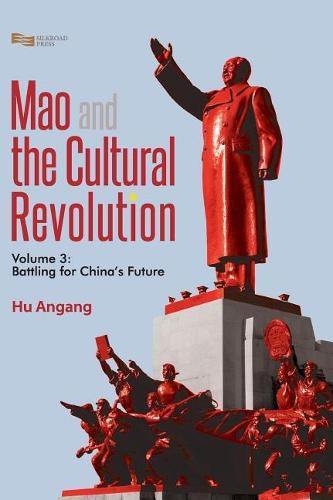Readings Newsletter
Become a Readings Member to make your shopping experience even easier.
Sign in or sign up for free!
You’re not far away from qualifying for FREE standard shipping within Australia
You’ve qualified for FREE standard shipping within Australia
The cart is loading…






This title is printed to order. This book may have been self-published. If so, we cannot guarantee the quality of the content. In the main most books will have gone through the editing process however some may not. We therefore suggest that you be aware of this before ordering this book. If in doubt check either the author or publisher’s details as we are unable to accept any returns unless they are faulty. Please contact us if you have any questions.
Acclaim national researcher Hu Angang presents Mao and the Cultural Revolution, an immensely rich account of the massive political event of 1966-1976 that brought seismic changes to the landscape of New China.
A culmination of Mao Zedong’s Political ambition, the Cultural Revolution restored his power and prestige as paramount leader, albeit at great costs to the economic and social development to the country. The impact of the movement – more significantly, the politices that drove it – deeply influences political philosophy in China today.
Hu Angang’s work provides a unique perspective and objective assessment of the progression of the Cultural Revolution, focusing on the intraparty politics, the Politburo’s international outlook, and the political though the Chinese leadership that shaped this pivotal decade.
Volume 3 analyzed the impact of the Cultural Revolution from both sociological and economic perspectives. Mao Zedong, being in his senior years, was gradually leaving the political stage. His decisions, however, catalyzed the power struggle between Jiang Qing and Deng Xiaoping, turning the situation into a white-hot ideological conflict. Hu not only provides a full picture of all of these conflicts, but he also evaluates the economic damage caused by The Cultural Revolution. Using statistics and data, Hu objectively analyzes its impact in economic and social terms, thereby summing up the collection with analysis on the influence of the Cultural Revolution on modern China.
$9.00 standard shipping within Australia
FREE standard shipping within Australia for orders over $100.00
Express & International shipping calculated at checkout
This title is printed to order. This book may have been self-published. If so, we cannot guarantee the quality of the content. In the main most books will have gone through the editing process however some may not. We therefore suggest that you be aware of this before ordering this book. If in doubt check either the author or publisher’s details as we are unable to accept any returns unless they are faulty. Please contact us if you have any questions.
Acclaim national researcher Hu Angang presents Mao and the Cultural Revolution, an immensely rich account of the massive political event of 1966-1976 that brought seismic changes to the landscape of New China.
A culmination of Mao Zedong’s Political ambition, the Cultural Revolution restored his power and prestige as paramount leader, albeit at great costs to the economic and social development to the country. The impact of the movement – more significantly, the politices that drove it – deeply influences political philosophy in China today.
Hu Angang’s work provides a unique perspective and objective assessment of the progression of the Cultural Revolution, focusing on the intraparty politics, the Politburo’s international outlook, and the political though the Chinese leadership that shaped this pivotal decade.
Volume 3 analyzed the impact of the Cultural Revolution from both sociological and economic perspectives. Mao Zedong, being in his senior years, was gradually leaving the political stage. His decisions, however, catalyzed the power struggle between Jiang Qing and Deng Xiaoping, turning the situation into a white-hot ideological conflict. Hu not only provides a full picture of all of these conflicts, but he also evaluates the economic damage caused by The Cultural Revolution. Using statistics and data, Hu objectively analyzes its impact in economic and social terms, thereby summing up the collection with analysis on the influence of the Cultural Revolution on modern China.